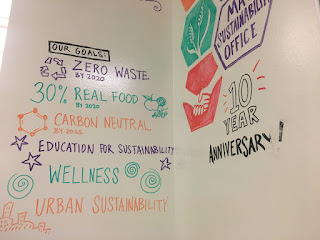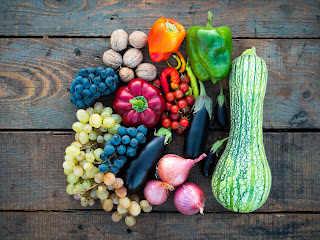Macalester Sustainability Plan and Social Justice
The Macalester Sustainability Plan set concrete goals for college sustainability and to track the implementation of the signed sustainability pledges, such as the American College and University Presidents’ Climate Commitment (ACUPCC). When the Sustainability Advisory Committee drafted the plan, it was designed to include social justice throughout the document so a specific section was intentionally not included. However, many people don’t understand that sustainability includes social justice.
Macalester’s definition of sustainability specifically includes social justice: “Sustainability is the continuous effort to meet the needs of the present generation without compromising the ability of future generations to meet their needs by working towards a healthy environment, social justice, and a strong economy. At Macalester, sustainability is infused throughout our core values of academic excellence, internationalism, multiculturalism, and service to society.” (Macalester College Sustainability Plan, 2009)
Here are some social justice aspects of the Macalester Sustainability Plan:
- Zero Waste by 2020: The modern environmental justice movement started with waste landfill siting in predominantly minority areas. The college adopted a zero waste goal and chose Eureka Recycling to process bottles, cans and paper. Eureka Recycling sells its recycling to local vendors and promotes social justice in how their employees are treated.
- 30% Real Food by 2020: Bon Appetit, the food service provider at Macalester, started the Circle of Responsibility staff-and-guest education program in 2003. The program offers information about how food choices impact the environment, community, and personal well-being. All of the company’s cafes also display Circle of Responsibility icons that help guests identify foods that are vegetarian, vegan, organic, locally sourced (http://www.bamco.com/timeline/circle-responsibility/). Many food items are fair trade, including all the coffee served. The 30% Real Food goal is an ambitious goal to add more local, organic and fair trade food to the dining hall.
- Climate Neutrality by 2025: Macalester signed the ACUPCC in 2007 to reduce our campus greenhouse gas emissions and teach students about climate and sustainability issues. As part of the ACUPCC, Macalester provides students and staff with subsidized bus and light rail passes in order to make public transportation more accessible.
- Education for Sustainability: As a college, our biggest impact on sustainability is our alumni. Our alumni make decisions on a daily basis about the sustainability of their communities, workplaces and families. The more we can educate our students about sustainability, the more these students can positively impact the world as global citizens.
- Urban Sustainability: Macalester College ties social justice to urban sustainability by practicing sustainable landscaping and reducing stormwater which benefits the health the urban community. Macalester also acts as an example of changing norms around sustainability issues.
- Purchasing: The purchasing goals specifically include language about promoting a positive ecological and social impact with the college purchasing power.
Sustainability Social Justice Projects Across Campus:
- Water: Clean drinking water is a global social justice issue. The college stopped selling bottled water on campus and using college funds to purchase bottled water in 2011. The student organizers on campus included social justice arguments in their reasoning for the bottled water ban.
- Civic Engagement Center: The CEC connects students with community service opportunities and has a student worker dedicated to environmental issues. An Action Fund provides funding for students’ entrepreneurial community projects. In addition, the The CEC also supports the Move Out Garage Sale and Socially Responsible Banking.
- Facilities Services: Facilities Services utilizes two outside groups that have significant social benefits to help with some of the work on campus: Focus Beyond Transition Services Program and Network for Better Futures.



Comments
Post a Comment